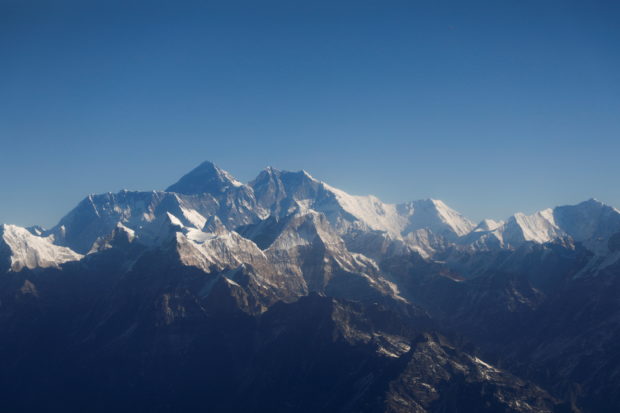Search called off for missing Nepali climbers on Everest

FILE PHOTO: Mount Everest, the world highest peak, and other peaks of the Himalayan range are seen through an aircraft window during a mountain flight from Kathmandu, Nepal January 15, 2020. REUTERS/Monika Deupala/File Photo
Kathmandu, Nepal — Rescuers have called off the search for three Nepali climbers missing on Everest, officials said Saturday, acknowledging the first fatalities on the world’s highest mountain this climbing season.
The trio were crossing the treacherous Khumbu Icefall on Wednesday as part of a supply mission when a block of glacial ice fell and swept them into a deep crevasse.
“After several search and rescue attempts, the operation has been called off. They are buried too deep and it does not seem possible to retrieve the bodies,” tourism department official Bigyan Koirala told AFP.
The Khumbu Icefall is a dangerous, ever-shifting expanse of glacial ice that requires climbers to navigate crevasses over rickety ladders.
All climbers must cross it on the route to the mountain’s 8,849-meter (29,032-foot) peak.
“This morning we went back to find them and were able to locate the area but it wasn’t possible to bring them back home,” Mingma Gyalje Sherpa of expedition company Imagine Nepal posted on Instagram late Friday.
The company also posted condolences on their Instagram account.
“Our hearts are heavy with grief as we mourn the loss of these brave brothers who dedicated their lives to guiding and supporting climbers.”
Nepali guides — usually ethnic Sherpas from the valleys around Everest — are considered the backbone of the climbing industry in the Himalayas.
They account for around a third of the deaths on Everest, underscoring the risks they take in service of the hundreds of adventurers aiming to summit the world’s highest peak.
For each expedition, they make several dangerous trips to ferry tents, food and oxygen bottles to high-altitude camps.
In 2014, an immense tumbling wall of snow, ice and rock killed 16 Nepali guides on the icefall, one of the deadliest accidents in the Himalayas.
Nepal is home to eight of the world’s 10 highest peaks and welcomes hundreds of adventurers each spring climbing season, when temperatures are warm and winds are typically calm.
The government has issued more than 500 climbing permits for various Himalayan mountains, including 243 for Everest, this season.